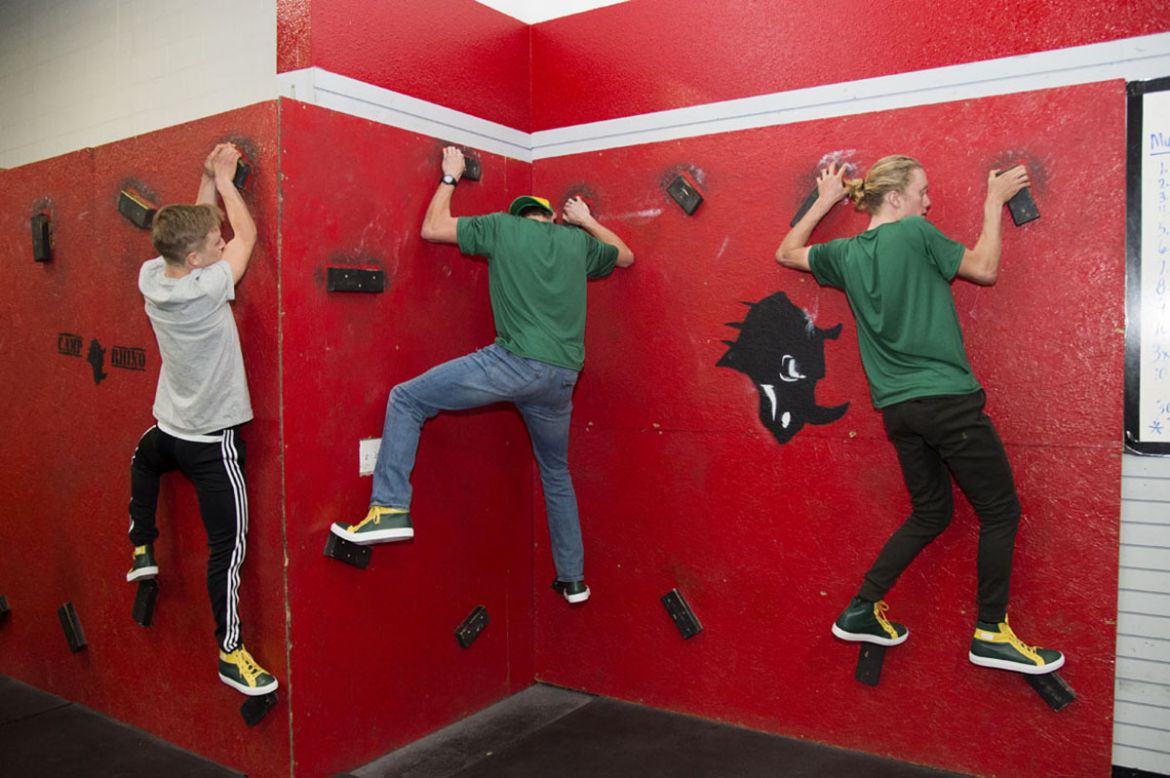Aevolo prepares for 2018 campaign with ninja training, paintball

Aevolo riders tackle a climbing wall at the team's Las Vegas camp. Credit: Casey B. Gibson cbgphoto.com
The final day of the Aevolo Cycling team’s January training camp was supposed to include a 180km ride along the desert roads surrounding Las Vegas. Instead, Aevolo director Mike Creed led his team on a short spin to Camp Rhino, a gym that promotes a class called Ninja Warrior training.
For several hours, the riders swung from monkey bars and scrambled through the gym’s various obstacle courses.
“Basically we tried to embarrass everybody with their lack of upper-body strength and coordination,” Creed said. “We had to work together — you know, that cliche team-building stuff.”
The Ninja Warrior class came on the end of three days of training and team-building activities in and around Sin City. The first day, Aevolo riders donned safety masks and body armor gear and played a zombie apocalypse game at a local paintball range. The second day, they raced go-karts.
Professional cycling teams often schedule social time and team-building activities into their training camps, to allow riders to blow off steam and foster camaraderie. These sessions often include a trip to the local pub for a few rounds of beverages, and a late night or two. There’s a different model with Aevolo, however, which only employs riders under the age of 23. In fact, just two of the squad’s 12 riders are old enough to drink.
“Nobody is getting too crazy at our camp,” said Creed, who stepped into the director’s seat in 2013 after racing professionally for more than a decade.
The lack of boozy libations is just one of the differences Creed has seen with his development squad, which begins its second season of existence. From 2014-2015 Creed oversaw the SmartStop pro team, helping multiple riders advance their careers in the U.S. domestic leagues, among them Eric Marcotte, Rob Britton, Travis McCabe, and Evan Huffman. Creed gained a reputation for identifying raw talent and helping the riders transform their talent into results with savvy tactical advice and motivation.
The calculus is more challenging in the development ranks because riders have yet to reach their physical potential.
“With pro riders, you generally have an idea of how good these guys are, and how much room they have for improvement,” Creed said. “With these [U23] guys it is wide open. I have all of this curiosity. There were many times when I went to races with no idea what to expect.”
In 2017, Aevolo riders gave Creed plenty of pleasant surprises. Canadian Jack Burke led the team’s general classification ambitions, finishing fourth place overall at the Tour de Beauce and sixth at the Tour of Alberta, where he won the young rider classification. Gage Hecht won the criterium at the Redlands Bicycle Classic and was second place at USA Cycling’s U23 national championships. Michael Hernandez earned the squad a plethora of top-five finishes in sprints.
Aside from the results, the team also learned to race as a cohesive unit.
Lance Haidet, 20, said the team underwent a transformation throughout its inaugural season. At the team’s first race in April, the Joe Martin Stage Race, Haidet said the riders were often out of position and unprepared for the chaos of the finish. Two months later, at Quebec’s Tour de Beauce, the team rode in unison to defend Burke’s lead in the best young rider competition.
“We had a real shock to the system at those first couple of races because pro racing is just so different,” Haidet said. “Coming out of the juniors, those races are like: You just go hard until the group of fast juniors is left, and then you duke it out.”
Haidet credited the team’s evolution to Creed’s leadership style. According to Haidet, Aevolo’s director set a realistic goal for each rider — goals that revolved around team-specific ambitions, rather than individual ambitions. Creed then held each rider accountable for that goal after the race.
“On days when we were trying to set up our rider for the climb, [Creed] would tell me I needed to win the sprint for a specific corner, or be the first wheel into the climb to set up our rider,” Haidet said. “There was always a race within the race that we were able to make happen.”
Aevolo riders will have plenty of opportunities for goal setting in 2018. The team will again target USA Cycling’s Pro Road Tour calendar, which includes the Redlands Bicycle Classic, Tour of the Gila, and North Star Grand Prix, among other events. It also plans to compete in the full USA Crits series, which is composed of 10 criteriums. Finally, Aevolo hopes to gain invites to the Tour of Utah and Colorado Classic events. Aevolo did not gain entry to the races in 2017.
“We got our feet under us last year. We have an idea of what we’re doing now,” Creed said. “Now it’s time to step up at [races] like Utah and Colorado.”
And Creed will continue to teach bicycle racing to a new crop of young cyclists. Aevolo does not pay its riders — rather the team provides equipment, travel and racing costs, and a small stipend for each rider. The small resources and age ceiling means that riders continually cycle in and out of the squad.
After last season the team saw Burke move on to Jelly Belly-Maxxis and Zeke Mostov ink a deal with Hagens Berman Axeon. For 2018, Aevolo brought on five new riders: Denzel Stephenson, Nick McKey, Fernando Islas Lopez, Alex Hoehn, and Kendrick Boots.
“I like the idea that U23 teams stay developmental,” Creed said.